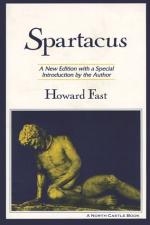|
This section contains 222 words (approx. 1 page at 300 words per page) |

|
The tale of Spartacus has long played a role in popular culture; "Spartacus' Last Address to His Men" was a forensic recitation heard at many a high school declamation. In fiction, the narrative as parable and history as a moral tale was frequent in popular writing, as evident in the works of B. Traven, a radical writer who, like Fast, wrote parables which became blockbuster entertainments, like Treasure of the Sierra Madre, a successful film in 1948. Bertolt Brecht, another defendant at the McCarthy trials, used parables for dramatic purposes, as did Arthur Miller, whose Crucible (1953) uses American sources to comment upon the trials. Classical historical settings had been popularized by Edith Hamilton in her books on mythology, and by Robert Graves, in I, Claudius (1934).
Roman themes were taken as commentaries upon the decline of Western civilization before the fascist onslaught, and many continental writers created parallels...
|
This section contains 222 words (approx. 1 page at 300 words per page) |

|




